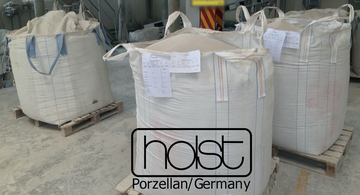Granules

In porcelain production, granulates are dry powders that are produced from slaggers using a special processing method in a sprayer. The term dry powder should be qualified, as this material, which is also referred to as pulverised grain mass, still has a residual moisture content of around 4 to 6 %.
In order to achieve sufficient strength of the green body after the pressing process, the slurry is additionally enriched with so-called binder suspensions. Binders act as an additional adhesive in the granulated powder. They can be of organic origin and usually contain talcum and synthetic polymers (polyvinyl alcohol). The time required to burn these binders and lubricants in the green body is of great importance. The organic polymers must be completely removed from the green body, as the carbon residues have a negative impact on both the sintering process and the quality of the porcelain. This process of removing the binders takes a long time, as the speed of polymer cleavage must not exceed the transport speed of the pyrolysis products.
In many porcelain factories, these polymers regularly cause problems during production and small defects in the porcelain. They are mainly responsible for pinholes in isostatically pressed flat products.
In our work with isostatic granules, we were able to clearly establish that the longer the granules rest and thus evaporate, the lower the number of needle punctures.
To make isostatic granules yourself, you need a lot of things. Many factories around the world are forced to buy this granulate as a ready-mix. As the main supplier of granulated powder, Imerys France has a firm grip on the international market: a tonne costs an average of 500.00 euros worldwide.
The production costs of a 28 cm diameter slab amount to 30 to 60 cents per granulate purchased externally, including the loss of raw materials. If you add the entire technology (costs for moulding, firing and processing), the net production costs of a white goods slab quickly amount to one euro or more.
In view of this cost situation, a market price of EUR 2.50 for a pizza plate with a diameter of 30 cm seems like sheer madness and ruinous business. This makes it clear what pitiful margins the porcelain industry is or has to work with today.
Producing the granulate yourself requires more than just a special technique. More.
